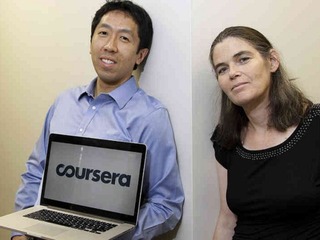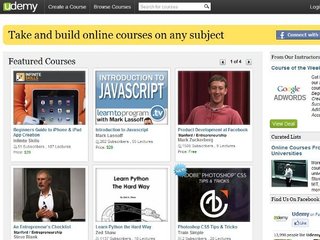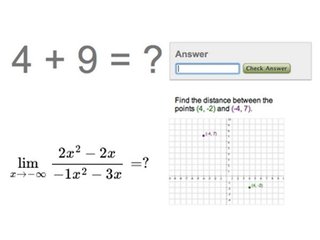The FDA outlines draft guidance on AI for medical devices
The agency also published draft guidance on the use of AI in drug development
Read more...
Massive Open Online Courses (MOOCs) are gaining legitimacy as a valid avenue for gaining much needed vocational skills. They also happen to be gaining traction at a time when much of the country is cowering under crippling student debt and a discrepancy between the amount of money a student invests in her education and the amount of money she’s likely to make in her field of choice after graduating.
While MOOCs are attracting more attention as a valid supplement—if not a possible alternative—to the failings of traditional higher ed, some problems remain, like the obvious fact that there are usually too many students to get individual feedback from the instructor (who you’re usually advised not to contact). But another problem plaguing the MOOC trend is authenticity. If, for example, you take a signature track course through Coursera to get a certificate that shows you took a course in human physiology or nutrition, how does anyone know you are the one who actually took the exam?
I got a chance to catch up with Verificient, a startup that aims to tackle that very issue. A participant in the latest Kaplan EdTech Accelerator powered by TechStars class, the startup has developed a “humanless” proctored exam platform.
Online education programs have grown by 418% over the last 10 years, and of the 23 million students in higher education today, 6.7 million have taken an online course.
Currently, the options for “proctored” online exams are lacking. One option is to call into a call center that then controls and/or monitors your desktop. Another option is a system that records you on video as you take the test, and then sends the video off to be analyzed to make sure you weren’t cheating (creepy). Coursera’s Signature Track uses keyboard analysis to verify the user’s identity, but that can easily be gamed.
Verificient has come up with technology that monitors test-takers without being creepy, but without being easily gamed either. When a student logs into the system, she fills out a profile and shows her photo ID to the camera. The system then does a full facial scan as well as a knuckle scan to verify her identity (the knuckle scan is performed by simply holding her hand up to the camera, and the scan gets logged away so that in the future, the system will be able to identify her for future exams).
When the student starts the exam, the system starts recording her and monitoring her desktop. And instead of having some creeper on the other end of the camera staring at her while she takes the test (which also sounds like a lot of money you’d have to pay to have someone sit and stare at a screen), the system’s algorithms flag suspicious activity and violations.

For example, if the student gets up and leaves during the test, the system flags that as a violation. In order to proceed with the exam, the student must acknowledge the violation and give an explanation. If the desktop monitoring finds that the student has pulled up an unapproved browser, that’s also flagged as a violation.

Then there are “suspicious” activities that aren’t necessarily violations, but could be indicative of cheating, like an abnormal amount of movement or sound, and even “facial suspicion.” Founders Tim Dutta and Rajnish Kumar explained that the platform’s specially designed scoring algorithms are designed to make sure that the face on the screen continually relates to the face in the profile pic. If it doesn't, it's considered suspicious (which could be a student making a pensive facial expression or getting a sibling look-alike to sit in for them). Additionally, facial suspicion could mean that the student is looking off to the left a lot instead of straight ahead at the screen.
When the test is over, the instructor can then see violations marked in red and suspicious activity marked in yellow. By clicking on it, the system will immediately take the instructor to the recording of the incident (such as the student getting up and leaving, or Googling the answers to the test).
“One of the things preventing Coursera and others from monetizing is that universities like Duke don’t have the confidence that the person getting the certificate is the person that took the exam,” said Dutta.
CEO Tim Dutta came to the company from management consulting and previous startups, while CTO Rajnish Kumar got his Ph.D. from Georgia Tech, where he worked on a computer visioning and video analytics project with the TSA that was designed to identify unconsctrained anomolies in video impressions.
With two weeks left to go until Demo Day, Verificient is already accruing an impressive user base. Dutta and Kumar are in discussions with three dozen schools, some of whom are in the process of testing out pilots. Verificient has already launched one pilot in a nursing program. And of all the startups in the Kaplan EdTech Accelerator class, Verificient is the only one to have been integrated into Kaplan’s platform.
Kaplan’s vote of confidence says a lot. As MOOCs attract followers looking for an alternative to high-cost college programs, could Verificient help drive them to mainstream acceptance? The startup is still in its early days, but the future looks bright.
The agency also published draft guidance on the use of AI in drug development
Read more...The biggest focus areas for AI investing are healthcare and biotech
Read more...It will complete and submit forms, and integrate with state benefit systems
Read more...Startup/Business
Joined Vator on
At Verificient Technologies, we utilize artificial intelligence, machine learning, computer visioning and biometrics in forming our Trusted Identity-as-a-Service (TIaaS), platform for identity verification and authentication. Over the last 5 years, we've become a leader in the industry to deliver continuous identity verification and digital remote monitoring. Weaving these advanced technologies together with user-centered design and award-winning customer service, our patented automated approach, pairs usability with accurate results and true scalability.
Today, we're serving a variety of markets, including Higher Education, HR and Recruitment, and Remote Labor-Force Management (virtual work at home agents).



